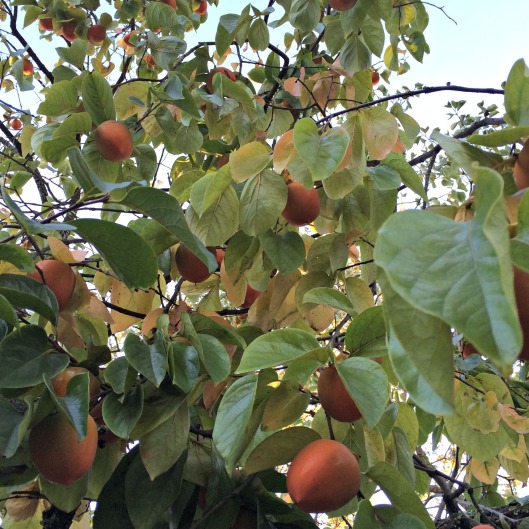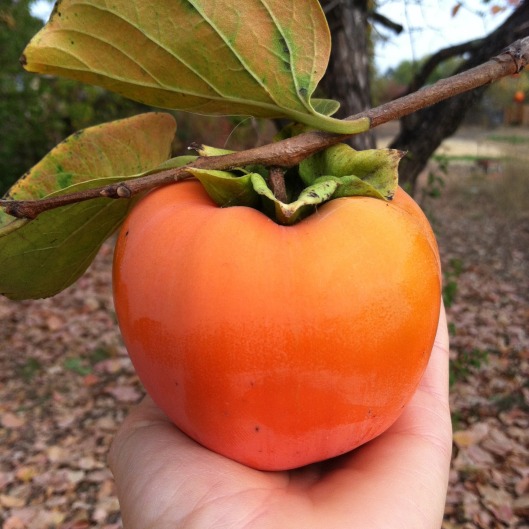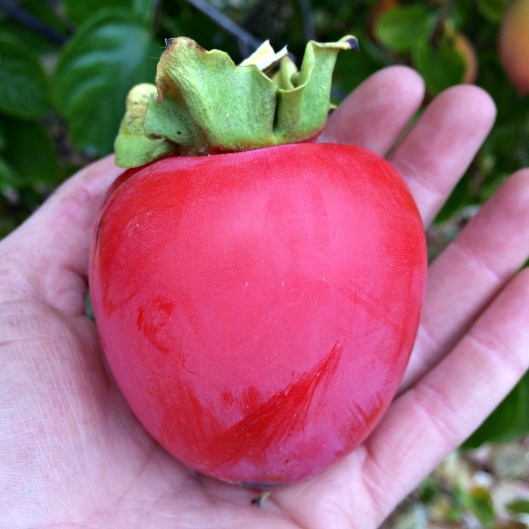I have the most beautiful persimmon tree. In spring, the glossy green leaves provide filtered shade perfect for having lunch under. In fall, the leaves turn a vibrant orange. As the year goes on, the fruit grows larger and the branches start to bow under the weight. By summer, the fruit starts to turn orange, and hang on the branches like glowing ornaments.

Persimmons come in two different categories, astringent and non-astringent. The type I have here, Hachiya, is an astringent type which means if you eat before its totally ripe, it will make your month feel like you’re eating a bag of chalk. Mmmm…tasty. You need to wait until they are soft before eating. Fuyu, a common non-astriegent type, have less tannins in them and can be eaten off the tree, while still hard like an apple.

My tree is a bountiful tree, producing bags and bags of fruit. I harvest as much as I think I can use and then offer the tree up to friends in my urban farming network. There are many types of persimmons, including one native to South region of America where the fruit is traditionally used to make pudding. My tree variety is native to China, was introduced here in the mid 19th century, and really thrives in my northern California climate.

By fall, the fruit is almost ripe. Left on the tree, the birds will either get them or the fruit will eventually fall off, making a big splatter of smashed fruit. I harvest the fruit when fully orange, but still hard. Left on trays around the house, they will ripen in a few days. When fully ripe, the fruit feel like water balloons. They also turn darker and more vibrant in color.

not quite ripe, but time to pick off the tree

persimmon, ready to eat
Once ripe, you can cut the top off and scoop out the flesh, then use the pulp in a variety of recipes. Or, if your doing a large batch, its easy to cut off the top then pass though my food mill. Stored in wide mouth pints jars, I freeze the pulp and use though out the year.

Like my apricot and fig tree, this tree was likely planted when the house was build. They are a common fruit tree found in older neighborhoods, and come winter, the orange fruit hanging like ornaments are easy to spot. My guess is they were one of the staples of the homestead and victory garden of generations past. Yet it seems like planting persimmon trees has fallen out of favor, as I’ve never seen a young tree in someones garden or hear of someone putting one in.
Perhaps one of the reason? They aren’t very versatile, especially my Hachiya. Fuyu at least can be thrown in salad, turned into a relish, or eaten out of hand. But the poor Hachiya are reduced to a jelly-like goo, making exciting recipes a challenge. Out of my 60ish cookbooks, only a few feature persimmon. But that should change! Persimmons are highly nutritious, containing (but not limited to) vitamin C, potassium, vitamin A, magnesium, B-complex vitamins and have anti-inflammatory properties.
Do you have a persimmon tree bowing over with fruit or have a neighbor leaving bags of them on your porch (no, I haven’t done that, yet), but don’t know what to do with them? Look no further!
How to Use Persimmons
I’ve spent countless hours, while simultaneously watching Star Track, of trolling the interwebs to answer this question! I’ve only made a few of these, but here is a list of tasty things for Hachiya Persimmons. I’m also hoping to try out drying whole and in halves, and attempting some fruit leather.
- Persimmon Cardamom Honey Ice Cream
- Vegan Persimmon Coconut Ice Cream
- Persimmon Margarita (which calls for blended fuyu, but I’m betting hachiya pulp would work!)
- Persimmon Creamsicle Smoothie
- Persimmon Buttermilk Smoothie
- Korean Cinnamon Ginger & Persimmon Dessert Tea
- Persimmon Crisp
- Dark Chocolate Persimmon Mousse
- Spiced Persimmon Smoothie
- Persimmon Margarita, version 2
- Apple Persimmon Pies
- Persimmon Cardamom Sherbet
- Persimmon Cupcakes
- Persimmons with Greek Yogurt and Pistachios
- Persimmon Bread
- Persimmon with Prosciutto
- Dried Whole, with Autumn Caramel Persimmon Cake
- Persimmon Oatcakes (my go-to persimmon recipe)
- Persimmon Pudding
Share the love and pass this post along! And as always I love to hear from you- what do you make out of persimmons? Do you love them or can’t stand them?













7 Comments
Marisa
October 14, 2014 at 1:41 pmI am so happy that you use and like the persimmon oatcake recipe!
John
October 14, 2014 at 8:08 pmHachiyas are great as a dried fruit. Start with ripe, but firm, Hachiyas: peel, slice and put in food dehydrator – the astringency goes away like magic when they dry. Or even better, but more labor intensive, dry them whole — google “Hoshigaki.” They are the best dried fruit ever. Have fun with your crop!
Melissa
October 15, 2014 at 8:37 amHi John, thanks for your comment! I tried Hoshigaki last year, but they molded before they got to the magical dry stage. I think I had to much moisture in my house, it did rain a few times during that attempt.
Adriann Saslow
December 6, 2016 at 9:11 pmMine also molded! It was so sad.
kiwiyarns
October 15, 2014 at 12:07 amI have to say I love the Fuyu but am not so fond of Hachiya. Great list! They are also very delicious dried.
Diana
October 16, 2014 at 7:01 amYou can pretty much sub in persimmon for pumpkin in any recipe (if you cut down the sugar a bit). For example this bread – http://www.theppk.com/2008/10/super-moist-pumpkin-bread/. Made it for lab party last week and it was a huge hit!
asonomagarden
October 16, 2014 at 1:47 pmMy friend here in town dehydrates hers. She cuts them in slices and puts them in her dehydrator. They look like jewels and taste like candy.